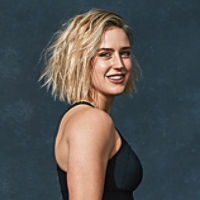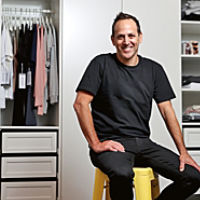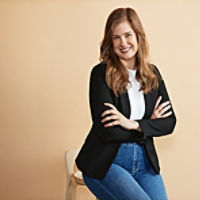This article is from the second issue of CommBank's magazine, Brighter.
Hailed as one of the best female forwards of all time, Sam Kerr is a household name and role model to football hopefuls and lovers of the game everywhere. She plays for Chelsea in the FA Women’s Super League and has captained the Australian women’s team, the CommBank Matildas, since 2019. Little surprise then that all eyes will be on Sam and the team as they seek glory on home soil when the FIFA Women’s World Cup 2023 is held in Australia and New Zealand this winter.
The West Australian might be known for her fleet-footed goals and gravity- defying celebrations on the pitch but off the field, her approach to money is more low-key. Sam concedes that it took a while – and a lot of trial and error – for her to learn to be more financially literate. “I’m a really good saver!” she says. “But when I was young, I definitely didn’t budget and spent all the money I had earned that month in a few days.”
To be fair, as a student in Fremantle/Walyalup there were promising signs that Sam wouldn’t always drain her piggy bank quickly. “In primary school, I used to get lunch money,” she recalls. “I’d save the change that came back and buy myself something at the end of term.”
You’d be safe in assuming that saving is a little easier today with a gruelling training and playing schedule that involves flying all over the world and little time for spending. But around her commitments to Chelsea and the CommBank Matildas – not to mention impressive sponsorship deals like the one she struck with Nike in 2019 to become the face of their Australian marketing – Sam considers herself a spontaneous spender. “I don’t have a lot of spare time so I really only spend money sporadically,” she says. And for big purchases, this lightning-fast striker takes her time. “Sometimes I need someone to push me over the edge to make a decision.”
 Sam Kerr
Sam Kerr
As a world-class athlete who had to work hard to overcome early career injuries and get where she is today, Sam understands the principle of compound gains both in her game and her personal finances. She admits the best piece of money advice she’s been given – and still follows – is “invest, invest, invest!”
Perhaps one of the reasons Sam is so careful to grow her financial gains is because had to fight for them. In 2015, Sam and the CommBank Matildas held a strike over their pay rate and conditions – a fraction of those enjoyed by male counterparts – by boycotting a tour in America. The strike was successful and then a few years later, in 2019, Football Federation Australia (FFA) and Professional Footballers Australia (PFA) struck a landmark collective bargaining agreement that resulted in pay parity between the men’s and women’s national teams.
 Mary Fowler, Sam Kerr, Caitlin Foord and Emily Van Egmond at a CommBank Matildas training session
Mary Fowler, Sam Kerr, Caitlin Foord and Emily Van Egmond at a CommBank Matildas training session
When asked to reflect on how this momentous win changed her life, Sam speaks to that all-consuming drive that sets elite sportspeople apart: “It allowed me to prepare properly to be the best athlete I can be.” And while there is still a long way to go towards true equality, Sam can see positive changes for female soccer players. “There are now equal opportunities to perform, from things like use of the right facilities to access to the services that we need to help us, such as massage and physio.”
This ability to focus on the now is one of the ways Sam copes with the mental and physical pressures that come with her career. “I try to focus on what I can control,” she says. “It can be tough but at the end of the day I’m human, too. I can’t do everything.” And while it’s clear to anyone who has watched her shatter records for both club and country – or witnessed her score nail-biting, match winning goals at the sport’s highest level – that she is a hard worker with steely determination, it seems even one of football’s greatest players is not immune to the odd pipedream. When asked where we would find her right now, if her schedule was cleared and money were no object? “On a yacht with friends and family.” Until then, we’ll be cheering when she hits the pitch with the CommBank Matildas.
Story by Brooke Le Poer Trench.
Read more articles from Brighter magazine.




